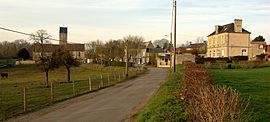Maizet facts for kids
Quick facts for kids
Maizet
|
||
|---|---|---|
 |
||
|
||
| Country | France | |
| Region | Normandy | |
| Department | Calvados | |
| Arrondissement | Caen | |
| Canton | Évrecy | |
| Intercommunality | Évrecy-Orne-Odon | |
| Area
1
|
5.72 km2 (2.21 sq mi) | |
| Population
(2008)
|
286 | |
| • Density | 50.00/km2 (129.5/sq mi) | |
| Time zone | UTC+01:00 (CET) | |
| • Summer (DST) | UTC+02:00 (CEST) | |
| INSEE/Postal code |
14393 /14210
|
|
| Elevation | 7–120 m (23–394 ft) (avg. 120 m or 390 ft) |
|
| 1 French Land Register data, which excludes lakes, ponds, glaciers > 1 km2 (0.386 sq mi or 247 acres) and river estuaries. | ||
Maizet is a small commune, which is like a town or village, located in the northwest of France. It is part of the Basse-Normandie region and can be found in the Calvados department.
Contents
Discovering Maizet
Maizet is a quiet place in the French countryside. It covers an area of about 5.72 square kilometers (which is roughly 2.2 square miles). In 2008, about 286 people lived there, making it a very small community.
Where is Maizet Located?
This commune is situated in the Calvados department. This department is known for its beautiful landscapes and its history, especially during World War II. Maizet is also part of the Caen arrondissement and the Évrecy canton, which are ways France organizes its local areas.
Maizet's Landscape
The land in Maizet has different heights. The lowest point is about 7 meters (23 feet) above sea level. The highest point reaches 120 meters (394 feet). This means the area has some gentle hills and valleys, typical of the French countryside.
How Maizet is Governed
Like all communes in France, Maizet has its own local government.
The Mayor of Maizet
The head of the local government is the Mayor. From 2008 to 2014, the mayor of Maizet was Gérard Le Corsu. The mayor is responsible for managing the commune's daily life, like local services and public works.
Working Together: Intercommunality
Maizet is part of a group of communes called Évrecy-Orne-Odon. This is an "intercommunality," which means several communes work together on shared projects. They might cooperate on things like waste management, public transport, or economic development. This helps small communes share resources and get more done.
See also
 In Spanish: Maizet para niños
In Spanish: Maizet para niños
 | James Van Der Zee |
 | Alma Thomas |
 | Ellis Wilson |
 | Margaret Taylor-Burroughs |




